Leveraging AI to Transform New Teacher Training


This blog post goes out to all my teacher coaches, who are often as overworked as teachers, but get half of the visibility or the credit.
Today, we'll revisit three of the most common coaching cases I had in my first new teacher cohorts, and explore how I would've leveraged AI-powered tools to support my coaching (God how I wished I had made Planning Period 3 years ago!).
Allow me to introduce my wonderful coachees:
- Anaya, the student-oriented yet stressed 8th grade science teacher who seems to be going a mile a minute when she delivers her lesson.
- Mateo, the self-driven yet struggling 5th grade ELA teacher that is either lesson planning at 10pm at night, or not planning at all.
- Sofia, the tactful yet tired 6th grade math teacher who is struggling to form deeper connections with her students.
(P.S. these names are made up, but the experiences are real! Shout out to all my teachers repping TFA's Bronx4Ever Teacher Cohort!)
You Can't Coach in Crisis Mode
Before we even dive into these coaching cases, we must recognize one thing. New teachers are often socially-prescribed perfectionists, because the immediate- results nature of public education is always in conflict with how great teaching habits, skills, and ways of being develop: Through the passage of time, while consistently practicing and applying deep feedback.
This immediacy vs deep growth conflict was most present during the first weeks of school, when I struggled to get my coachees to give me of time a day to sit and reflect on the dispositions and decision frameworks that they needed to develop to begin to master their craft. Instead, I was often met with:
"I don't even have my lesson plan ready for tomorrow, how am I expected to sit down and just talk for 45 mins?"
And that's true, new teachers do not have any time to spare, so with time I realized that the only way to coach teachers in crisis mode was by first offering quick solutions to their crisis, and leveraging these to create opportunities for deeper reflection. So I turned my coaching meetings into a sneaky 45 minute block with two goals:
1.Come up with quick, skill-focused solutions to my coachee's biggest lesson planning concerns within the first 15 minutes of the conversation.
2.Spend the next 30 minutes making a deeper connection to how the lesson planning concerns are tied to deeper teaching dispositions and ways of being.

But Merlin, how did you make sure that you only spent 15 minutes doing skill coaching in order to spend those other 30 minutes diving into the deep stuff?
Well the truth is that it rarely happened within that time-frame, because my coachees and I often got stuck perusing the web for exemplars that we could adapt to their classroom. Skills-oriented coaching is the area for which I wished I had a tool like Planning Period, and probably the biggest reason for which I decided to create it.
Ok, now we're ready to dive into these cases!
Coaching Anaya

My observations:
The first you notice when you walk into Anaya's classroom, is how engaged students are by her passion for science! The students can tell that Anaya is a true academic, as she's often rapidly firing out laboratory jargon when she's explaining the key concepts of her lesson, and while they try really hard to follow her by frantically trying to take notes about what she's saying, Anaya and I can tell by the results of the days exit ticket, that she's lost the students somewhere along the way.
The Immediate Solution (15 minutes):
Anaya is pretty self-reflective, so I when I let her come up with ways she could improve, she mentions that she does struggle to find the right words when delivering her lessons, and that she wants to get better at making the way she orally presents information more accessible to all of her students.
I chime in with my observations of the speed at which she is going with her students, and point out that she'd benefit from scripting out some parts of her lesson to plan out her language.
I'd then try out the Lesson Plan Scriptor on one of her previous lessons and discuss how she would adjust the teacher talking points to fit her teaching style (This is a jedi mind trick to invite her to think about what her teaching style is, which as a new teacher I'm sure she's still developing).
Below is the how the Lesson Plan Scriptor suggested talking points Anaya's lesson on volume:
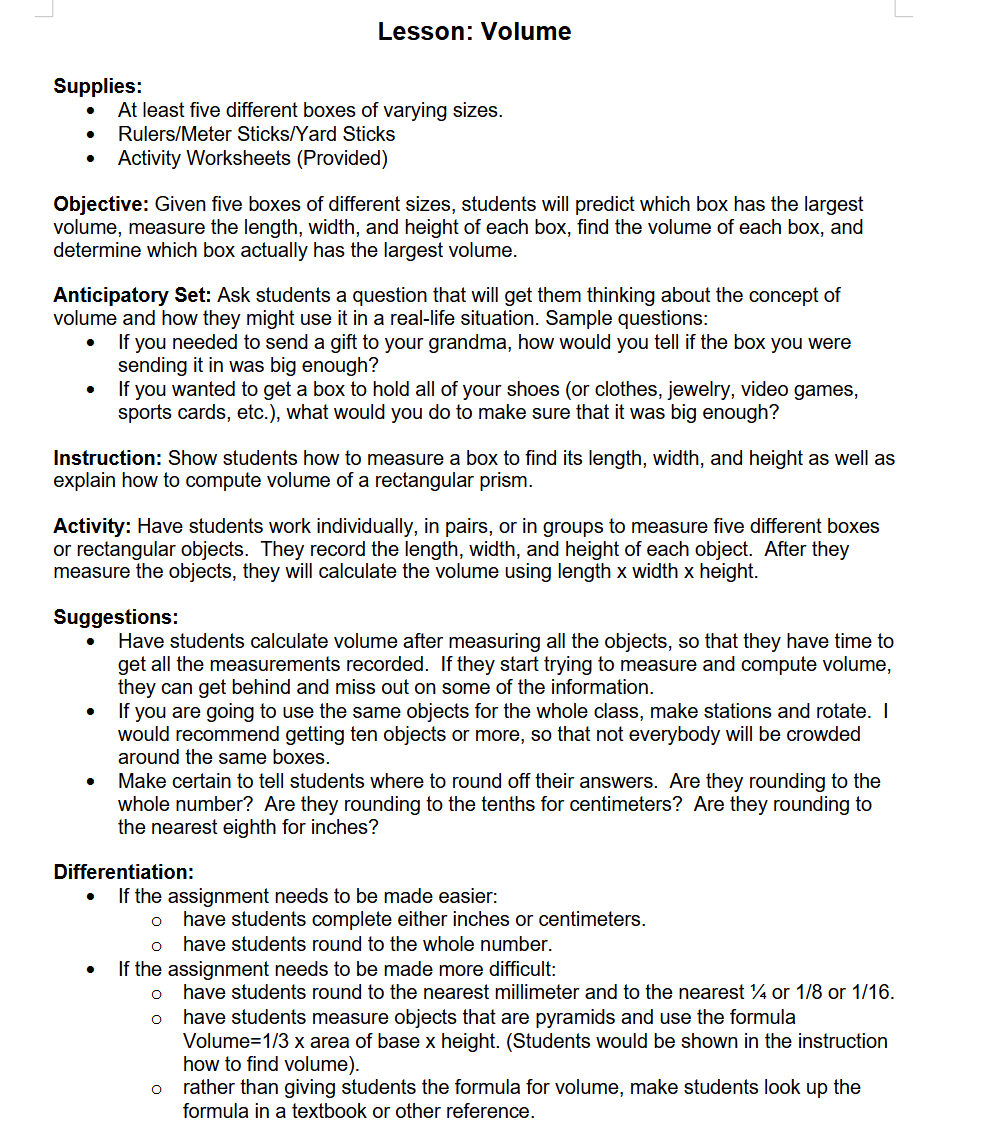
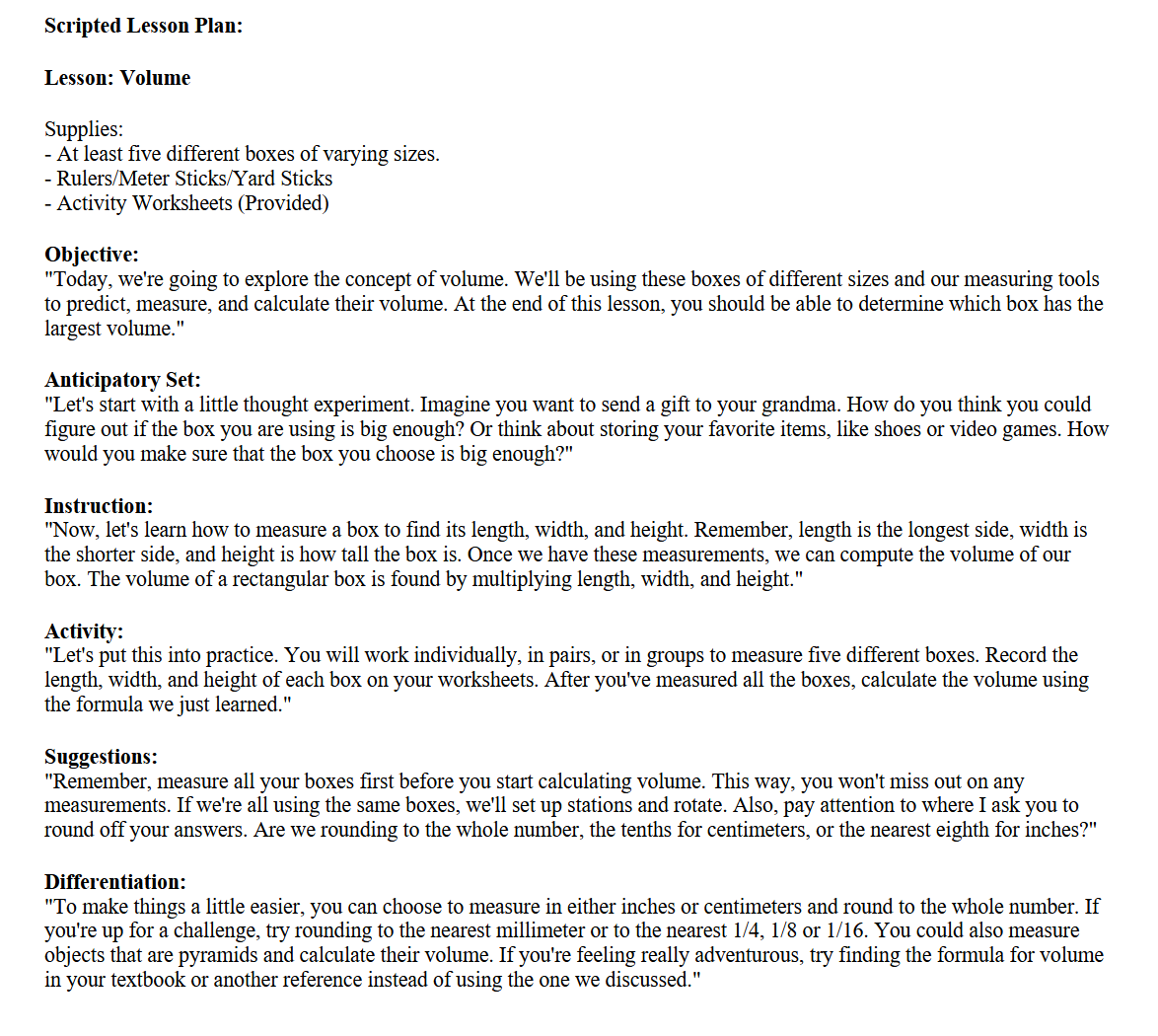
After we discuss the exemplar, I'll invite Anaya to script two lessons for next week. And see if that helps improve her lesson delivery.
Going Deeper (30 minutes):
Now that the immediate is out of the way, Anaya and I have time to talk about what's really going on. My suspicion is that Anaya is actually just developing her own self-awareness, and needs to practice models of being present and intentional when she's delivering her lessons. So we'd spend the next 30-minutes figuring out ways to remain present with her students in manners that feel genuine to herself. As a coach, I'd explore Anaya's presence and intention in the three following ways:
- Before class: How is Anaya centering herself before she delivers a class? What mindfulness activities can she try as she transitions from one class to the next?
- During class: How is Anaya connecting with the room as she is delivering her lesson? Which students can she emotionally anchor on, in order tell whether or not they are interacting with the lesson, rather than just collecting information?
- After class: What quick protocols can Anaya follow in order to mindfully reflect on how class went?
Coaching Mateo

My Observations:
Mateo was certainly one of my more independent teachers in my cohort. When I checked in with him, he would often say that he did not need any help, as he was just getting accustomed to the workflows of teaching. My coaching brain flags this as a warning that Mateo may be silently (and even unknowingly) drowning in work, and may just be going through the what he believes are the "motions" of every day teaching. This became pretty evident when I walked into his classroom and saw him conduct a read-aloud without stopping once to give students a chance to discuss what they were reading.
The Immediate Solution (15 minutes):
I was there when Mateo learned what CFUs (checks for understanding) are, so I know this strategy is certainly familiar to him. This makes me infer that he's just not giving himself enough time to plan for CFUs during his read-aloud activities. So I sit down with him and directly ask him if he noticed that there were no stopping points during his lesson read-aloud.
From his response I confirm that planning is the issue, and I affirm that no matter how much time to plan we have, sometimes we miss some things in our lesson plan, and that we learn to naturally integrate those the more feedback we receive. Then I'd ask him to run his last read-aloud through the CFU maker and discuss, which 2 CFUs he believed would have been beneficial to implement in his last class.
Before we move on to the deep end, I ask Mateo to use the CFU maker to embed 2 CFUs in each of his read-alouds this week, and then we will come back and notice whether or not these have an impact on how his students engage with the text. (Spoiler alert, they do!)
Below is a before and after of Mateo's CFUs thanks to Planning Period's CFU Maker.
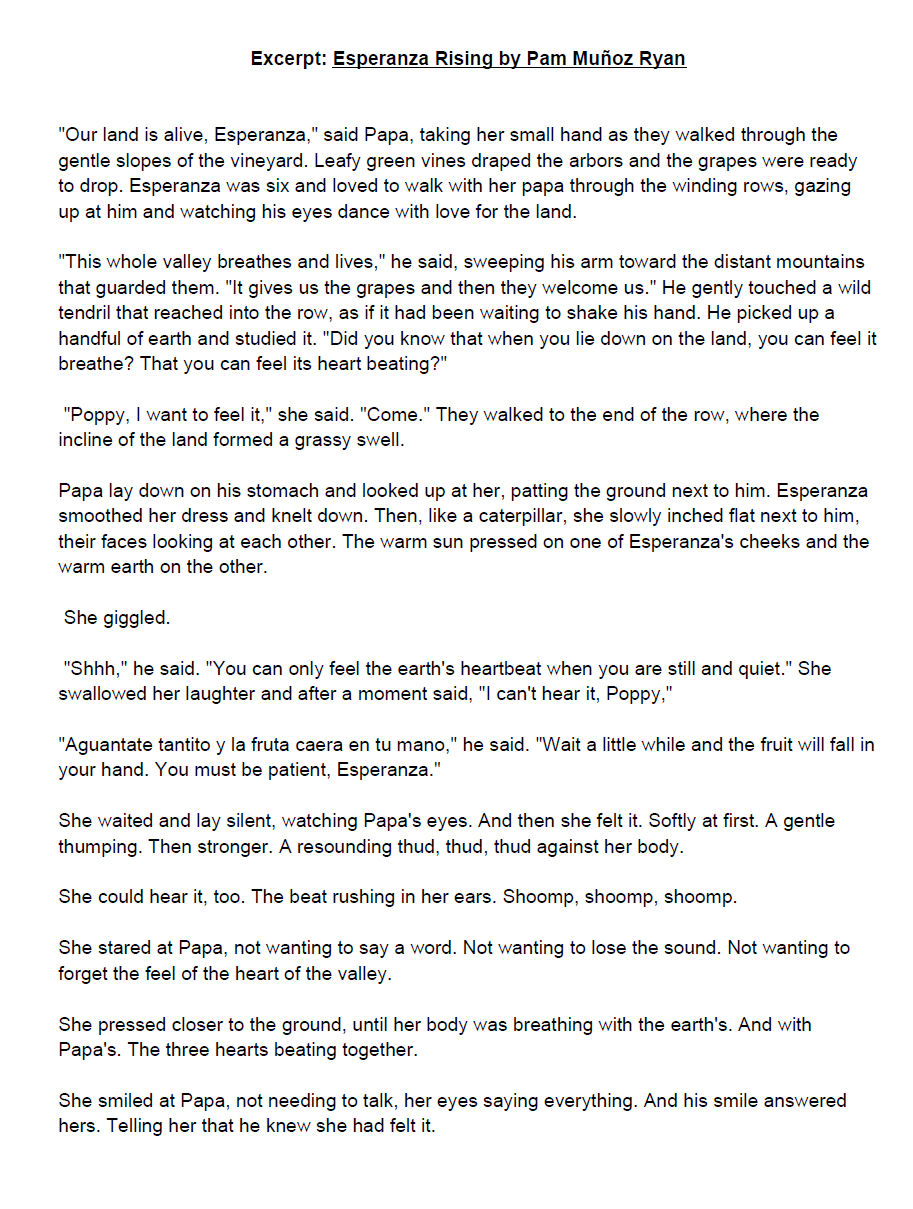
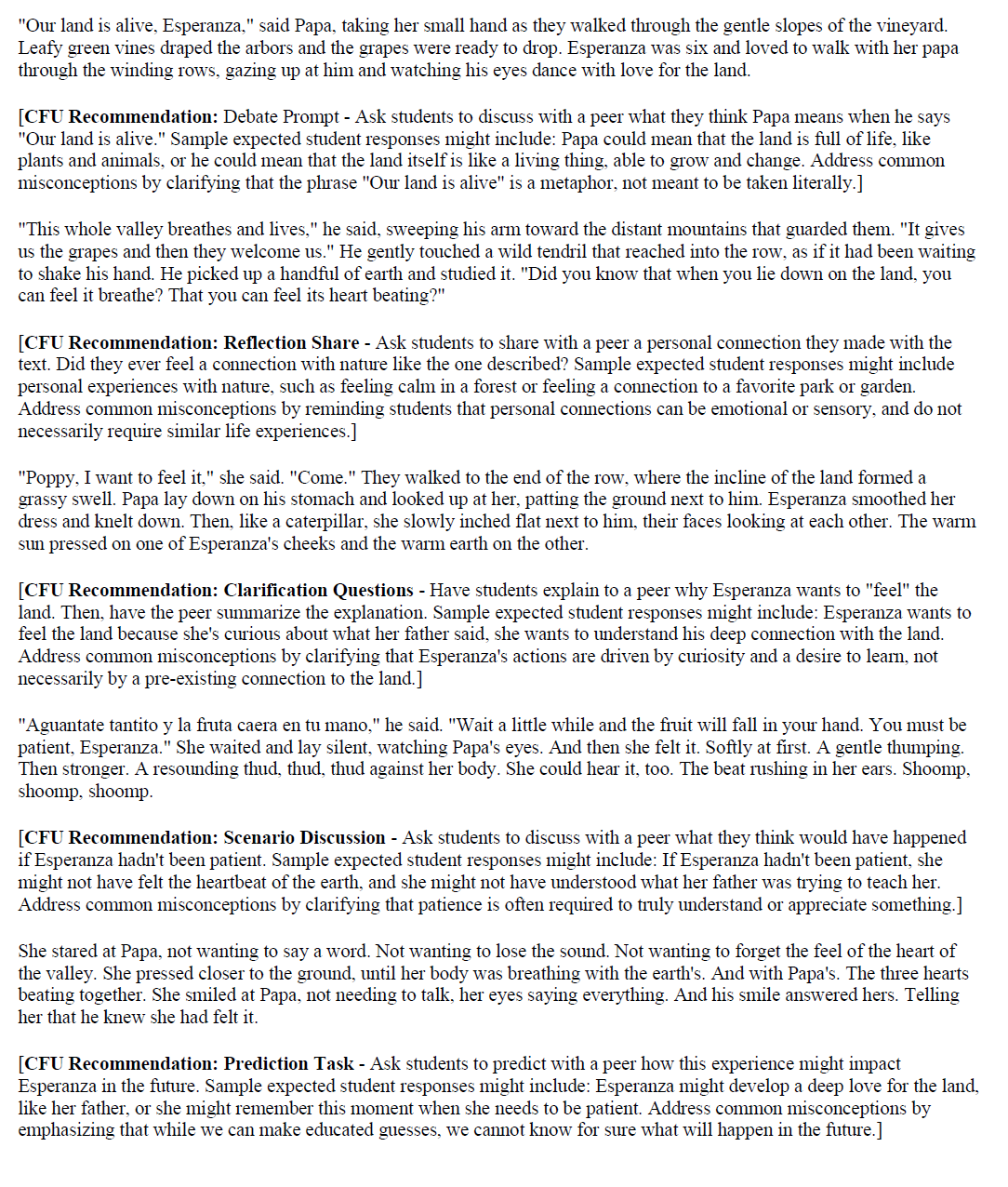
Going Deeper (30 minutes):
I think we can leverage Mateo's independence to help him develop self-sufficiency by coming to a true understanding of the key tenants of his lesson. That is, if we were to envision what a lesson looks like? What would Mateo see? As a coach, I am looking to help Mateo come to a visualization of a lesson in which:
- There are ample times for students to share their thoughts and expand their opinions in a variety of ways (moving, writing, speaking, listening)
- The teacher often responds to common student misconceptions and guides the class discussion without overtaking it.
- The class comes to a shared understanding or consensus about the lesson of the day through their conversations.
Coaching Sofia

My Observations: Sofia is probably the teacher that most reminds me of me in this bunch. As an immigrant, she comes from an education system that could only be described as more strict. She often mentions that where she comes from, students are expected to sit quietly while the teacher delivers the lesson, and that it really bothers her when she gets pushback from her students when she assigns them work. I saw this dynamic play out when she was introducing her math warm-ups, and her students immediately started voicing that they found the exercises "boring".
The Immediate Solution (15 minutes):
As a foundation to the deeper conversation, I think it will be important to ask Sofia if the students gave her any specific feedback as to why they thought her warm-up activities where "boring". Sofia noted that her students said "these questions are just not interesting to us". From there, it was clear that Sofia and I needed to focus on the "to us" part of that sentence, and begin figuring out ways to make those questions more engaging to her students.
So, we decided to take turns using the Word Problem Recontextualizer to re-write some of her warm-ups to include her students names and interests. Sofia was smiling at looking at some of the new examples that reflected her student's identities and interests, and it was apparent that her students will likely be smiling too.

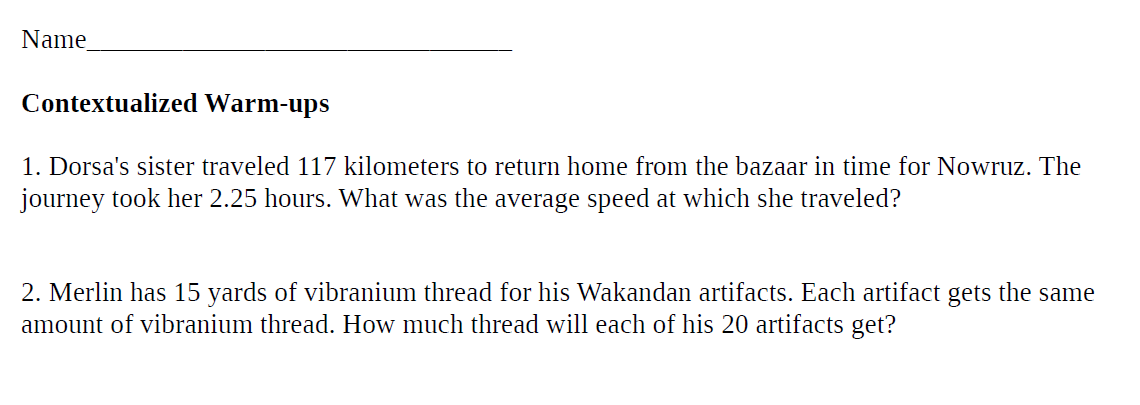
Going Deeper (30 minutes):
Sofia is most certainly due for a conversation in which she begins to unlearn some of the student expectations that have been socialized into us through our own educational experiences. As an immigrant from the Dominican Republic, I have a lot in common with Sofia when it comes to being students in teacher-centric classrooms, and I too struggled to listen to my own students when through their feedback, they were giving me the keys to being a better teacher for them. I believe sharing my own learning with Sofia will not only open her up to be vulnerable with me, but also just normalize the fact that she needs to shift in order to improve.
Below are some of the questions Sofia and I would spend time sharing our perspectives on:
- How do our own educational experiences impact the ways that we teach?
- Do the ways that our educational upbringing shape our teaching style have a positive or negative influence on our students?
- Is there a former teacher or yours, that you feel like you now sound like in your classroom today? (I'll share the story of how I sounded like my elementary math teacher, who was super strict and scary)
- Is there a former teacher or current colleague that you'd like to sound like or just emulate in their teaching style? ( I'll probably say Mikeale, one of my first coaches, who was always funny, honest and direct with his students no matter what)
We'll bring the exemplars you bring the heart
Like teaching, so much of coaching is work of the heart. Coaches must build strong connections with their coachees in order to truly influence their improvement. AI-Powered lesson planning tools like Planning Period could never replace your intentional, human-centered coaching plan. However, offering your new teachers with great lesson component exemplars to discuss and integrate into their own lessons certainly opens the door for deeper coaching to happen.
So coaches, try us out, use any of our tools today to help your new teachers solve that "specific" problem they're facing in their class. So that you can get into the work that happens at a deeper level. Accompanying awesome humans who've chosen to teach the next generation on their journey to becoming better teachers, one day at a time.
